ROBERT WILLIAMS BUCHANAN (1841 - 1901)
|
ROBERT WILLIAMS BUCHANAN (1841 - 1901) |
|
|
|
|
|
|
|
|
DIARY ARCHIVES (3)
2014 to 2020
22 August 2014 Right, that was a long break. My last entry in this diary was dated 7th May, 2013. Shortly after that the programme I’ve always used to ‘do my websites’ went into meltdown - not surprising since it was designed to run on Windows 95 and came free on a computer magazine -and I couldn’t add anything else to the site until I’d transferred it all to an updated version - which also came free on a computer magazine. The problem then was that the two versions weren’t compatible and I had to transfer the text and pictures from one to the other, page by page. The problem there was that the text usually lost its formatting in the process. Also, the old computer really needed replacing. The problem there was that the updated version of the programme wouldn’t work on the new version of Windows (the dreaded 8), so I had to find one running Windows 7. And the problem there, of course, is that once this machine hits that point, as all computers seem to do, when they get fed up and start acting funny, I’ll have to go through the whole process again. The answer of course is to learn html programming and dispense with the programme and do the site properly, but I can’t see that happening. Or, I could get the site finished in the next five years and wash my hands of Mr. Buchanan and the horse he rode in on, but, again, ditto. In the meantime I should make the usual apologies. If the site does have an occasional whiff of OCD, it’s because when I started, there was nothing online about Buchanan and so when I came across a review of one of his books or plays I would happily add it to the site, and I have continued to do that (although perhaps not as happily) as online newspaper archives have begun to blossom, so, it’s just something I do. Likewise with the transcriptions of his poetry books. Originally they weren’t readily available at the Internet Archive or elsewhere, so I decided to add them all to the site, and the process continues, even though it may seem a bit redundant. Another thing, when I started the site everybody had 14” monitors, so for the last few years there’s been a big space on the right-hand side, even on my upgraded 17” monitor. God knows what it looks like on the big widescreen things you can get these days. On the other hand I am the last man alive who doesn’t have a mobile phone, so I’ve no idea what it looks like on those tiny screens. I have made it slightly wider, and for the Plays section I’ve added a list of plays down the side which makes it wider still. Rather like that menu at the left, which only occurs on this and the Home page, but which gives a more detailed menu for what’s on the site, expanding on the brief menu headings at the top and bottom of the page. As I transferred the pages from the old programme to the new (newer), I also made the mistake of adding things as I went along, which made the process even more protracted. So, for the regular visitor to the site (I have absolutely no idea why I just wrote that) there is some new stuff. It would be useful now to present a list of changes, but it’s been going on for so long, that I’ve forgotten what I’ve added. Saint Abe and his Seven Wives, what seems to be the final issue of Light, several essays, a few odd poems ... and a lot more about the ‘Fleshly School’ controversy. I’ve also shifted the Buchanan and the Law and Buchanan and the Press sections from Miscellanea to the main menu. The only thing I haven’t finished updating and transferring is the Buchanan Timeline which currently stops in 1876. This was just taking too long and I was finding so many mistakes in the old site that I thought it best to upload the majority of the site and add the rest of the timeline later. So, here it is, the new, updated Robert Buchanan site. No doubt there will be problems over the next few days as I find all the lost links and glitches, but I hope you’ll bear with me as I sort them out. _____
1 June 2015 I didn’t mean to leave it this long. After the ‘great collapse’ and the reconstruction of the website last year I posted the last entry in this site diary before I’d completed the whole process. The Timeline pages were taking too long, so I thought I’d better get the rest of the site online, and add them later. Which is what I have been doing. The reason they’re taking so long is that I’ve been going through the various online newspaper archives and adding new things to the site as I find them. I did think the Timeline would be finished by the end of 2014, and I then intended to add a new entry in this diary. But, it’s now the beginning of June and I’ve only got as far as 1890. The other reason for adding this entry now is the fact that I have to thank certain people for sending me information (one of which involves an apology on my part for being daft). I also have to note a couple of recent interesting additions to the site. So, here goes. I’d like to thank Sigrid Handel for telling me about her PhD. thesis, “Populäres Drama, literarisches Feld und Intertextualität – Robert W. Buchanans Adaptionen für das viktorianische Theater (Popular Drama, the Literary Field and Intertextuality – Robert W. Buchanan’s Adaptations for the Victorian Theatre)” (Bielefeld University, Germany, 2013. 437 p.) which is available online. I should add that this is in German, which I don’t know at all, but it may be of interest to those who do. For the rest of us it’s the dubious delights of Google Translate. The six plays examined in detail in the thesis are Storm-Beaten, Agnes, Sophia, The Sixth Commandment, Miss Tomboy and The Wanderer From Venus. I did ask Sigrid if Buchanan was well-known (or known at all) in Germany, since I had noticed various German editions of his novels (including a translation of God and the Man which was published in 2007), but apparently not. I also have to thank Helen Assaf for providing information about Theo Marzials, who provided a song for Storm-Beaten, and helping to clarify the dating of several letters. And, finally, I have to thank Catherine Bull for sending me a photo of Soroba Lodge, Buchanan’s house in Oban. |
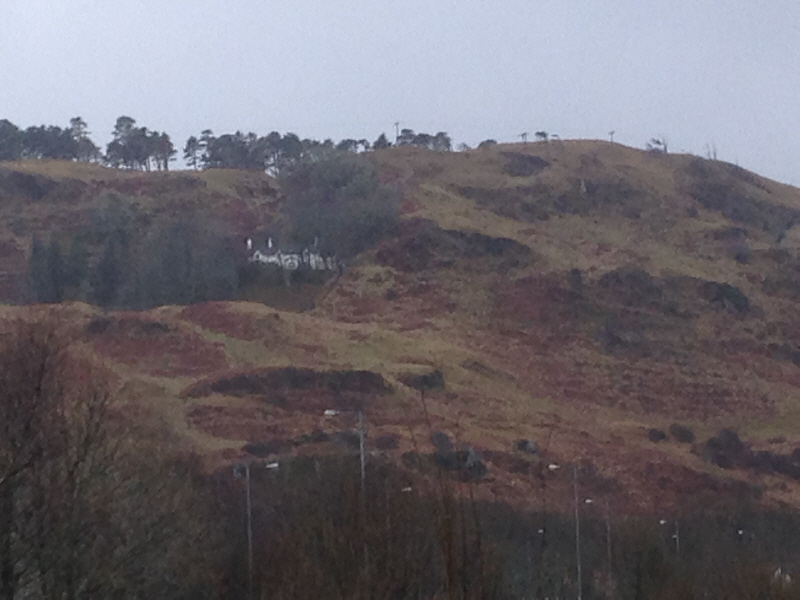 |
|
This is where the apology comes in. I did spend a day in September, 2013 in Oban, looking for Buchanan’s house and following a completely false trail of my own devising. I added an account of my Scottish trip to the Miscellanea section. So now, faced with real evidence, what was I to do? Rewrite the piece and hope nobody noticed, or delete it altogether? In the end I’ve left it where it was and added a note and the photo of the real ‘White House on the Hill’ to the page. Of the stuff I’ve added, I wish I could remember it all. I did find a reprint of Buchanan’s letter about the trapeze artist, Zæo, which is quite fun. And, in the Essays, I’ve added one from an Australian paper, published in 1892 and containing an attack on Kipling seven years before ‘The Voice of the Hooligan’: “Though Mr. Kipling’s ballads have no claim to be called poetry, they represent, in their sudden popularity, the fatal disease infecting and destroying the poetic spirit in England. To Mr. Kipling belongs the proud distinction, if it is a distinction of beginning where most men end—in the basest sort of Toryism.” (From ‘The Muses in England’). And then there’s this photo of Harriett Jay circa 1907: |
|||||
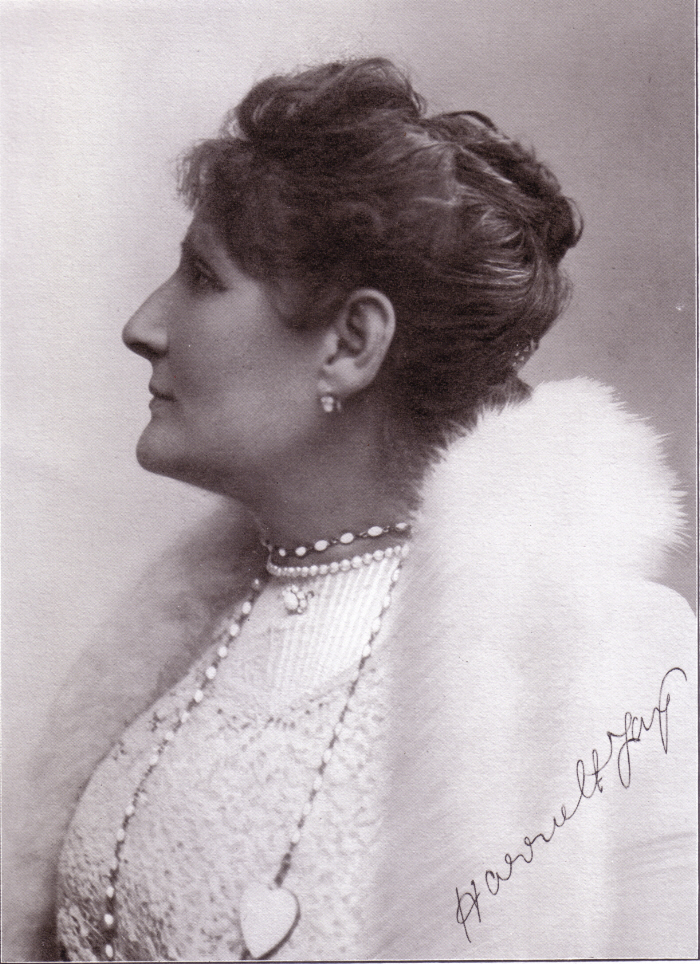 |
|||||
|
The final item in the section devoted to When Knights Were Bold was a description of an item on ebay which I couldn’t afford - the 1908 Ist Anniversary Souvenir from Wyndham’s Theatre consisting of a folder containing one drawing and eleven photographs (including Harriett) relating to the play. This, or one exactly like it, recently turned up again on ebay and this time at a reasonable price, so I bought it, and you’ll find it here. Finally, I’d like to thank BBC4 for showing the Danish series, 1864, which concerns the Second Schleswig War, during which Buchanan went to Denmark, accompanied by his father, as a war correspondent for The Morning Star. He hasn’t appeared in it yet, and for those fearing my sanity, I should add that I don’t really expect him to. _____
10 June 2015 I think this is worth a mention since it’s not every day that Robert Buchanan’s name pops up on national prime-time television - well, that is, on BBC4 at 9 o’clock on a Monday night. It occurred in the first part of How to Be Bohemian with Victoria Coren Mitchell, broadcast on 8th June. Victoria Coren Mitchell had reached the Pre-Raphaelites in her history of ‘Bohemians’ and was dealing with Dante Gabriel Rossetti, when she cited Robert Buchanan as a representative of the moral majority in opposition to those fun-loving, rebellious scamps. She then read an extract from the pamphlet version of The Fleshly School of Poetry. In a way it was strangely comforting to find Buchanan was not forgotten, and his only legacy, that bloody essay, still lives on. It was a pity though, that in the section on Oscar Wilde, she didn’t mention Buchanan again and the fact that he was one of the very few public figures to speak out on his behalf. And I don’t know what Buchanan would have made of it all, since he was always the outsider, in a way, the true Bohemian. As he wrote in his ‘My First Book’ essay for The Idler: “But I had other friends, more helpful to me in preparing my first twin-offering to the Muses; the faces under the gas, the painted women on the bridge (how many a night have I walked up and down by their sides, and talked to them for hours together), the actors in the theatres, the ragged groups at the stage doors. London to me, then, was still Fairyland! Even in the Haymarket, with its babbles of nymph and satyr, there was wonderful life from midnight to dawn—deep sympathy with which told me that I was a born Pagan, and could never be really comfortable in any modern Temple of the Proprieties. On other points connected with that old life on the borders of Bohemia, I need not touch; it has all been so well done already by Murger, in the ‘Vie de Bohème,’ and it will not bear translation into contemporary English. There were cakes and ale, pipes and beer, and ginger was hot in the mouth too! Et ego fui in Bohemiâ! There were inky fellows and bouncing girls, then; now there are only fine ladies, and respectable, God-fearing men of letters.” Still, it was nice to hear his name and a few of his words, daft though they were, on the telly. How to Be Bohemian with Victoria Coren Mitchell is available (at the moment) on the BBC iplayer. _____
28 July 2015 Just uploaded 1891 - 1893 of the timeline. One of the reasons it’s taking so long is that I get sidetracked. Buchanan spent a week ‘adapting’ Sardou’s Theodora for Grace Hawthorne in 1889, who then spent the next five years dragging her lions round the country performing it - maybe even longer, I found a review from the Nottingham Theatre Royal in June 1899 - before going to New York and being arrested as an accessory in an attempted murder in 1915, then returning to London, where she died in the St. Pancras workhouse in 1922. So, no great revelations about Robert Buchanan there, but I found it interesting. And, since the How to Be Bohemian with Victoria Coren Mitchell programme is no longer available on the BBC iplayer, I’ve added the relevant clip to the site. _____
24 September 2015 Just uploaded 1894 - 1895 of the timeline. Only two years this time, but 1894 was Buchanan’s annus horribilis (thank you Ma’am) with his bankruptcy and the death of his mother. The former was triggered by the disastrous production of A Society Butterfly, starring Lillie Langtry, and among the new additions to the site are a poster for the play and this photo of Mrs. Langtry in the role of Mrs. Dudley. |
|||||
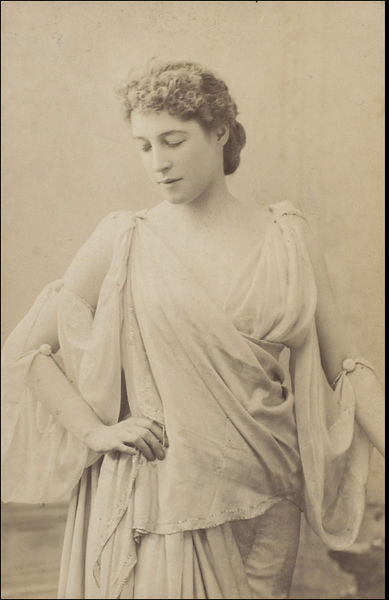 |
|||||
|
Among the other additions to the site I should mention the four letters Buchanan wrote to Dr. Alfred Russel Wallace (naturalist, scientist, explorer, author, social campaigner and humanitarian) which are available at Wallace Letters Online (part of the Natural History Museum site). I’ve added them to the Letters section. I have managed to get out of the house and on 15th August I visited the Church of St. Peter in Bexhill where Buchanan’s father is buried. I didn’t really expect to find his grave, but since I was in the area, I thought I should have a go. Unfortunately the majority of the inscriptions on the gravestones have been eroded by the sea air, so it was impossible to make anything out. I’ve put some photos on the Robert Buchanan Snr. page and here’s one of an owd man wandering aimlessly round a graveyard to go with those photos of a younger version wandering round the graveyard of St. John the Baptist’s in Southend. |
|||||
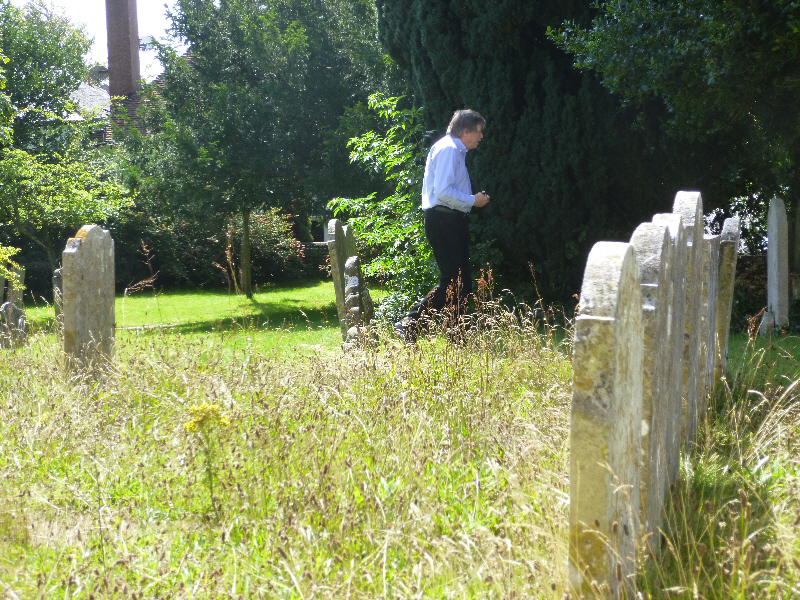 |
|
But I’m not the only one to do it. I received an email from Bob Davenport with a review of The English Rose from The Illustrated London News. Bob’s interest lies not with Buchanan, but with the actress, Olga Brandon, who was the original ‘English Rose’. And his interest in Olga Brandon stems from his blog, ‘Studied Monuments’, subtitled ‘Stories from a London Cemetery’. His piece on Olga Brandon makes for fascinating reading and includes this rather stunning photograph. |
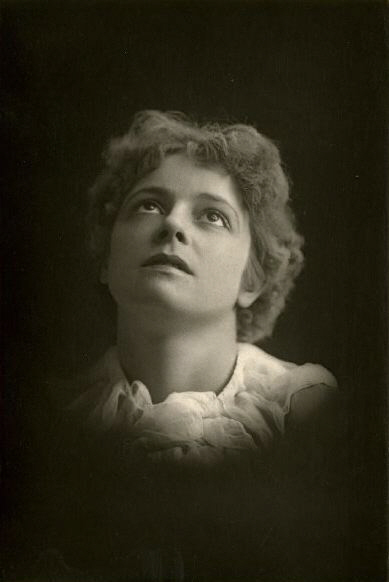 |
|
Bob also came across an item in the Indianapolis Journal of 1st May, 1892, which read: “Olga Brandon, the American girl with midnight eyes, ... has been engaged to star for five years in plays to be written for her by Robert Buchanan. She has a villa near London and puts money in the bank.” I’ve not found any confirmation of this. She was advertised to appear in The Trumpet Call and she did take over from Mrs. Patrick Campbell for the final performances of The Black Domino, but beyond that, the only connection with Buchanan is The English Rose. However, towards the end of Bob’s piece, there’s a rather touching mention of Buchanan’s collaborator, George R. Sims. _____
8 November 2015 Next part of the timeline, 1896 - 1898, added to the site. _____
10 March 2016 The final parts of the Robert Buchanan Timeline - 1899 - 1901 and 1902 - now - have been added to the site. Of course, the Timeline will never really be finished, there will always be gaps, but hopefully I can fill in a few more as I go along. This was the last section of the site which needed updating after the ‘Great Computer Collapse’ of May, 2013, and it’s taken a while since I’ve been adding other things to the site along the way. This time the major additions are: Buchanan’s letters to George Bernard Shaw (from the British Library collection). A section on The Glasgow Sentinel, the newspaper which Buchanan’s father purchased in 1851 and which published some of Buchanan Jnr.’s earliest work. Another short story, ‘Poor Bonnithorne!’, from the 1889 The Era Almanack. I’ve also added more information to the Buchanan’s Music and Filmography pages, including this picture from the 1915 production of Alone in London: |
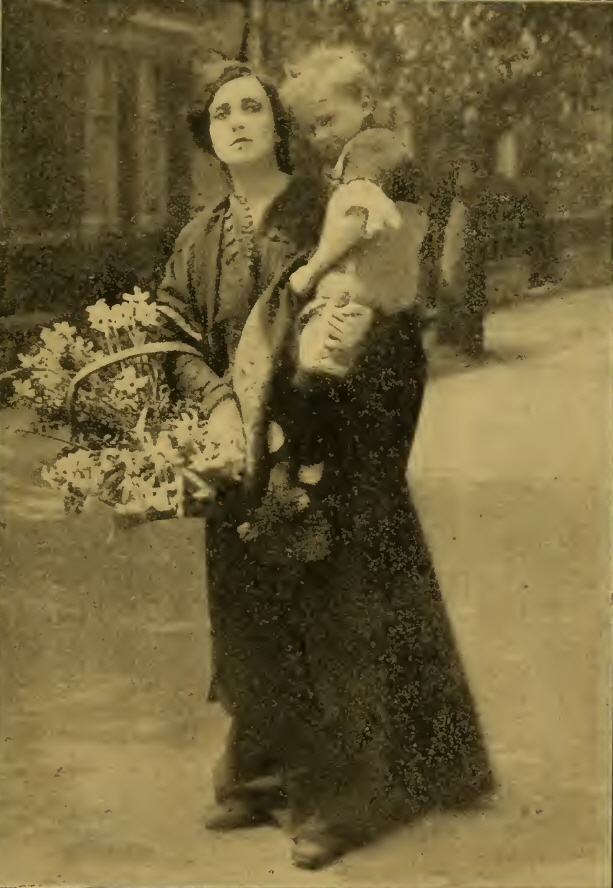 |
|
And I have to thank Catherine Bull again for sending me the relevant pages of An Old Oban Pictorial by Mrs. Agnes D. Black, which, as well as including a drawing of Soroba Lodge, also revealed that Marie Corelli spent some summer holidays there. _____
16 June 2016 A few more additions to the site: 1. The British Library Newspaper Archive put the rest of the copies of Robert Buchanan Snr.’s newspaper, The Glasgow Sentinel online, so I’ve extended that section. Originally, the only copies relevant to Robert Buchanan (Jr.) were from 1858 and, as it turned out, that year was his most prolific for the paper, but I did come across some interesting items from 1856, 1857 and 1859. Perhaps the most interesting was Buchanan’s earliest contribution (at least the earliest I could find) to the paper, a poem entitled ‘On the Death of an Infant Sister’, which led to a search for the details of the only other child of the Buchanans - Margaret Anne - who was born on 24th March, 1853 and who died, seven weeks later on 11th May. I also came across The Glasgow Sentinel reviews of Buchanan’s first two books of poetry, Poems and Love Lyrics and Mary, and Other Poems. Robert Buchanan and The Glasgow Sentinel 2. I finally came across a copy of Is Barabbas a Necessity? (on the HathiTrust site), Buchanan’s 1896 pamphlet explaining why he decided to become his own publisher: 3. In 1899 Buchanan wrote one of his ‘open letters’ to The Sunday Special concerning what he considered was the decline of Bexhill-on-Sea. I don’t have the original, but the bulk of the letter was reprinted in the Bexhill-on-Sea Observer following his death. This and some of that paper’s comments on his letter from 1899 are available in the Letters to the Press section. 4. My favourite novel by Harriett Jay is The Priest’s Blessing and I’ve always been looking for a damning review from the Irish Catholic Press, and now I’ve found one. It’s from the Dublin paper, The Nation and was published under the title, “An Infamous Libel”. 5. Staying with reviews, I have to thank Clare Stainthorp for letting me know about this review of The City of Dream from The Scottish Art Review written by Constance Naden. 6. That curious item in the Miscellanea section, ‘Like A Giant Refreshed’, which may or may not have anything at all to do with Buchanan, now has the original letter from the St. James’s Gazette, replacing the reprint from the New Zealand paper. 7. Another addition to the British Library Newspaper Archive is The Entr’acte, a paper devoted to theatrical matters.. This contains a number of cartoons of Buchanan, which I’ve placed on the relevant pages. However, I thought it might be useful to group them all here as well. Click the pictures for the full version, and to see them in context, click the links to the relevant pages on the right. |
|
|
||||||||||||||||||||||||||||||||||||||||||||||||||||||||||||||||||||||||||||||||||||||||||||||||||||||||||||||||||||||||
|
And finally, an actual item of Buchanan news. Soroba Lodge is for sale - details on the Zoopla site. _____
14 September 2016 1. The following have been added to the Poetry section: Undertones was published by Moxon in 1863 and was Buchanan’s first book to be published after his move from Glasgow to London. In 1865 a second edition, extensively revised, was published by Strahan and this is the one which was subsequently reprinted by Chatto & Windus and included in the Collections of 1884 and 1901, so this is the edition I’ve put on the site. However, I have also added a couple of pages about the first edition of 1863, detailing the changes. White Rose and Red was Buchanan’s second ‘American’ work, published anonymously in 1873. 2. Another of Buchanan’s diatribes against Ibsen and the New Drama is his review of Edmund Gosse’s translation of Hedda Gabler published in The Illustrated London News in January, 1891. This is the opening sentence: ‘Whatever else may be said of it, “Hedda Gabler” possesses one great claim to be read—it is the “funniest” book of the season.’ If you want to read more, it’s here: The French Novelette as Norwegian Drama 3. A while back there was a letter from Buchanan to Gerald Massey for sale on ebay which I placed on the Random page of the Letters section. However, as I was searching the Gerald Massey site for mentions of Buchanan I came across a transcription of a letter from Buchanan to William Hepworth Dixon regarding the Scottish poet, James Macfarlan. It referred to a piece he’d written about the recently deceased Macfarlan which he wanted Dixon to publish in The Athenæum, so I tracked that down and it is available in the Letters to the Press section, along with the accompanying letter to Dixon. I have to thank Ian Petticrew (webmaster of the excellent Gerald Massey site) for letting me add the transcription of the letter and also David Shaw, who as part of the email discussion to find the whereabouts of the original letter, pointed me in the direction of UCLA which has quite a large collection of Buchanan’s letters, which I had completely missed when I was originally compiling the List of Locations of Buchanan’s Letters. _____
28 November 2016 The following have been added to the Poetry section: _____
4 July 2017 Rather a long gap there, sorry about that. One reason for the delay was that I’ve been trying to finish the (frankly pointless) task of putting all of Buchanan’s poetry online. Still haven’t got there yet, but I have managed to sort out the ‘Collected’ and ‘Selected’ Works. Since I’d begun the process, a number of years ago, of transcribing all of Buchanan’s single poetry books and putting them on the site, it seemed the best thing to do with the Collections, etc., was to just list the poems and add links to their original appearance in book form. This turned out not to be as easy as I thought. The three volume King edition of 1874 caused the most problems since Buchanan had revised a lot of the poems in that Collection. In 1882 Buchanan, with his new publisher, Chatto & Windus, brought out two Selections. Selected Poems contained mainly poems from Buchanan’s books, whereas the majority of the poems in Ballads of Life, Love, and Humour had only appeared in magazines before. It seemed to make sense to take the latter out of the ‘Collections’ section and add the book to the regular list. There are still inconsistencies - mainly due to my having added poems to the site in the past which in fact were reprints from these ‘Collections/Selections’ which I’m only adding now. So, a lot of the additional ‘London Poems’, which appeared in the 1884 Poetical Works, and which I’d added to the London Poems section of the site years ago, actually first appeared in book form in the 1874 Poetical Works. Likewise, several poems which were first published in the 1892 The Buchanan Ballads Old and New, were subsequently added to The New Rome of 1898. Rather than shifting everything around, I settled for just adding the links. Although I know have the majority of Buchanan’s poetry on the site, there are still some omissions. Firstly, there are the odd poems published in magazines and newspapers, which never made it into a book, not even the two volume, 1901, Complete Poetical Works. I have a few more of these to add to the site, which I’ll do shortly, and then, after that it will be just a matter of seeing what comes my way. Secondly, there are Buchanan’s first two books of poetry, both published in Glasgow before he made his way to London. Although I occasionally have a look on abebooks, or ebay for Poems & Love Lyrics and Mary, and other Poems I doubt very much whether they’ll ever turn up - and at a price I can afford. So, it’s more a matter of waiting until one of the various book digitisation projects get round to them and sticks them on the Internet Archive, or the Hathi Trust, or Google. And thirdly there are three other books which contain Buchanan poems - the early collaboration with Charles Gibbon, Stormbeaten: or Christmas Eve at the “Old Anchor” Inn (which may cause the same problems as the Glasgow books), the late collection of short stories, Red and White Heather, which does contain a couple of poems (and is not a problem - I’m just waiting to add it all to the site, since I’ve already got most of Buchanan’s stories here), and finally, the most okkerd (awkward) of the lot, Wayside Posies. Buchanan edited Wayside Posies for the Dalziel Brothers and obviously wrote some of the poems himself, but since they are all anonymous, which ones are by Buchanan? At some point I will address the problem, but not yet. So, for now, here are the following additions to the Poetry section of the site: Ballads of Life, Love, and Humour 1. Poems (Boston: Roberts Brothers, 1866.) 2. The Poetical Works of Robert Buchanan (3 vols. London: Henry S. King & Co., 1874. Boston: James R. Osgood and Co., 1874.) Volume II: Ballads and Poems of Life, Lyrical Poems etc. Volume III: Coruisken Sonnets, Book of Orm and Political Mystics 3. Selected Poems (London: Chatto & Windus, 1882.) 4. The Poetical Works of Robert Buchanan (London: Chatto & Windus, 1884.) 5. The Buchanan Ballads Old and New (London: John Haddon and Company, 1892.) 6. The Complete Poetical Works of Robert Buchanan (2 vols. London: Chatto & Windus, 1901.) Volume I is identical to the 1884 Poetical Works.
As well as the above I’ve also added more newspaper clippings etc. to the other sections (mainly the Plays of course) of the site, but there is one addition which I must mention. This only came in the other week, an email from Judy Denison of Colorado, which contained a transcript of a letter from Robert Buchanan to her great-grandfather, James Kennedy. I already had two poems by Kennedy on the site - one written after Buchanan left America in 1885, the other commemorating his death. These were in the relevant sections, but since I now had a letter, I thought I should bring them all together on one page. Especially since Judy informed me that her great-grandfather had named his only son, Robert Buchanan Kennedy. So, for the poems, the letter, and some biographical information, click below: I promise I won’t leave such a long gap next time, in fact I have to catch up on some more ‘Fleshly School’ material which turned up during my enforced stay in a 1930s movie serial (I could explain, but I won’t). Until then, here’s another photo of Harriett Jay I came across, from The Sketch (24 July, 1907 - p.18). |
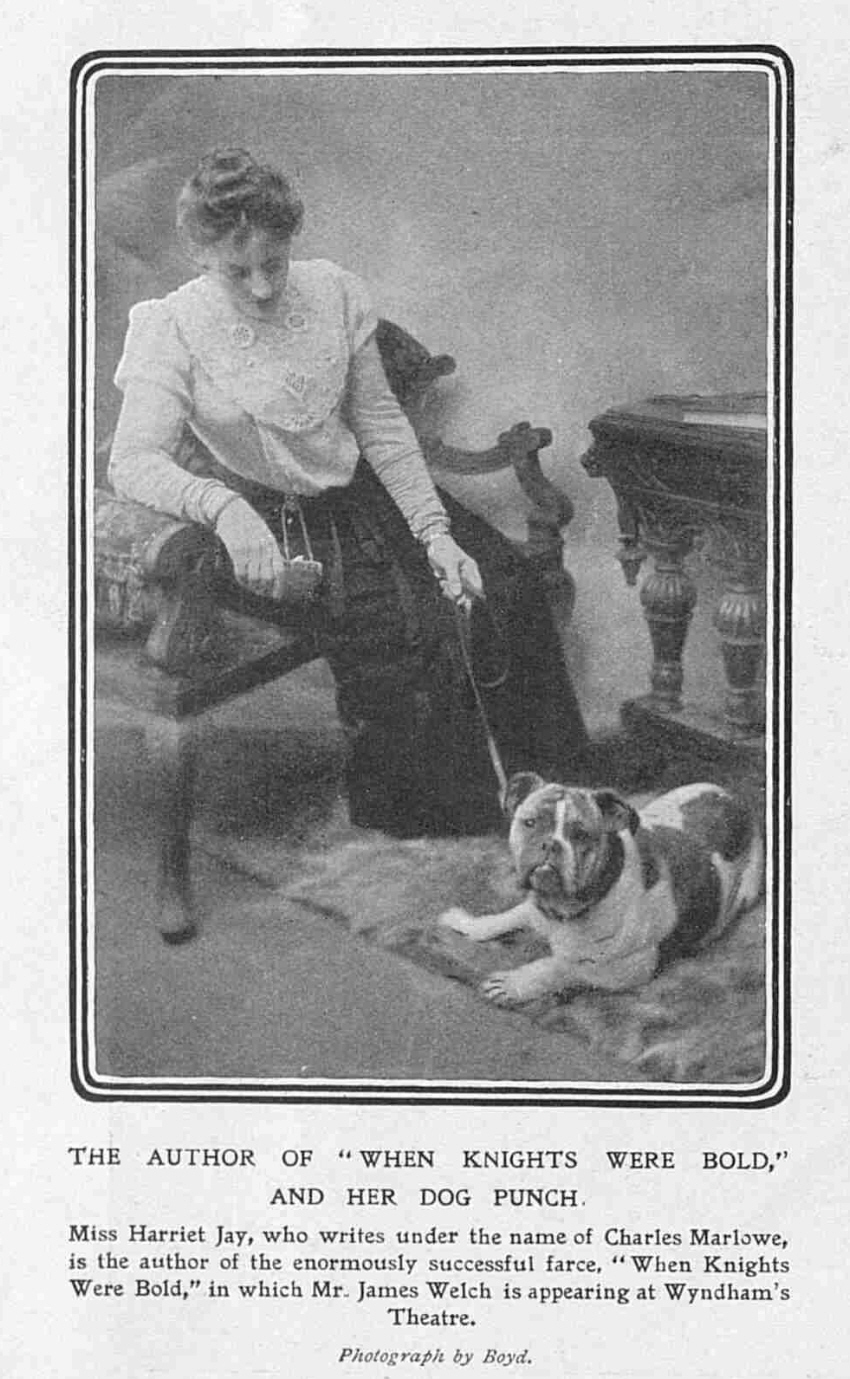 |
|
27 August 2017 Another quick thank you to Judy Denison, who sent me a scanned copy of Buchanan’s letter to her great-grandfather, James Kennedy, mentioned in the last update, so that I could fill in the odd gaps. I’ve added the revised version to the Random Letters section and the page on James Kennedy, which also has a few more biographical items on James and his son, Robert Buchanan Kennedy, courtesy of Judy. _____
19 December 2017 Finishing the year with a few more Buchanan poems from various sources: Snow-Music (The Athenæum, 3 March, 1860) Italy, 1859-60 (The Athenæum, 31 March, 1860) The Crocus (The Athenæum, 14 April, 1860) Rain (The Athenæum, 26 May, 1860) Autumn (The Athenæum, 20 October, 1860) The Country Curate’s Story (The Welcome Guest, December, 1860) The Snowdrop (The Athenæum, 23 March, 1861) The First of July (The Athenæum, 6 July, 1861) Souvenirs (Once A Week, 27 July, 1861) In The Mountain (The Athenæum, 22 March, 1862 Ad Virgilium: the Third Ode of the First Book (The Athenæum, 20 September, 1862) Merlin and the White Death (Once A Week, 20 February, 1864) A’Beckett’s Troth (Once A Week, 14 May, 1864) Verner Ravn: a Drama (The Argosy No. 1, December 1865) At The Threshold (A Round of Days, December 1865) The Neighbour (Good Words, November, 1871) The Latest Tournament: an Idyll of the Queen (The Saint Pauls Magazine, January, 1872) Mazzini (The Saint Pauls Magazine, April, 1872) The Gifts (Cassell’s Magazine, October, 1873) The Mountain Ruin (Cassell’s Magazine, May, 1874) The Spirit of the Snow: a Winter Idyll (The Gentleman’s Magazine, April, 1875) Cinderella: a Child’s Song of the Season (Good Words, November, 1876) Also, poems from Stormbeaten: or Christmas Eve at the “Old Anchor” Inn (1862), Red and White Heather: North Country tales and ballads (1894) and a selection of poems (either definitely or possibly by Buchanan) from the Christmas gift-book, Wayside Posies (1866). And then there is the curious case of Newton Neville. Coincidence, or yet another Buchanan pseudonym? _____
16 March 2018 At the moment I’m going through the copies of The Daily Telegraph on the British Library Newspaper Archive site. I’ve been waiting a while for these to appear since the Telegraph was one of the papers which Buchanan used for airing his views. Until now I’ve been using copies of his letters from The Coming Terror or extracts printed in provincial newspapers, so, now I can replace those with the originals. At least, that was the plan. The Telegraph scans are not of the highest quality, which means that searches do not always work, and also when downloading the .pdf files, the quality drops again for some reason, so, for many of the letters and reviews, the transcribing has to be done from the BLNA site itself. So, it’s taking longer than expected. However, I have already added some of the Telegraph theatre reviews and when I’ve finished Buchanan’s letters (and the responses) I’ll let you know. In the meantime, I have to mention this: |
|||||||||
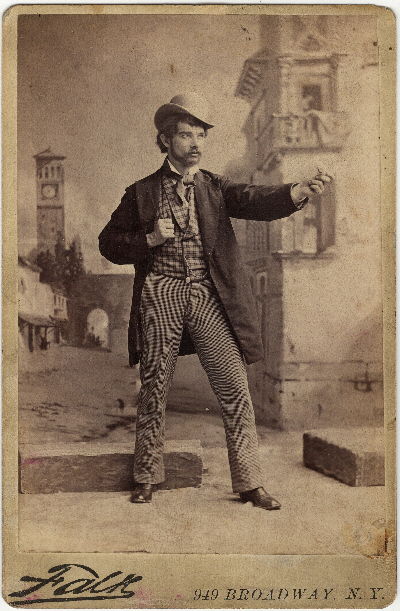 |
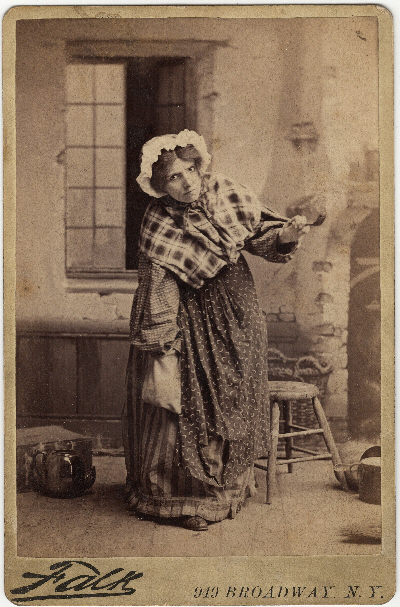 |
||||||||
|
I have to thank Charles Bell, who emailed from Australia, attaching the above images. They are Charles’ great-great grandparents, the actors Walter and Sarah Reynolds (aka Miss Grace Hathaway) in the roles of John Biddlecomb and Biddy Maloney from Alone in London. In fact, they played those parts in the original production of the play at the Chestnut Street Theatre in Philadelphia on 30th March, 1885. According to newspaper reviews, Walter Reynolds was still rescuing Annie Meadows from the sluice gates at Cleveland’s Opera House a year later, in February, 1886. Charles ended his email with the following additional information about Walter Reynolds: “As a side note, since you have an interest in drama I should say a bit more about Walter. Walter was by 1885 a playwright and theatre manager in his own right having had some success in Australia and New Zealand before going to America. He later became a theatre owner and politician in the UK (London County Council) and lived to a ripe old age. Very late in his career he returned to theatre production and had a great success on the West End in the 1930s with his play ‘Young England’ which is famously also known as the worst play in history.” I was intrigued by that last comment, so found some more information about Young England on the jot101 site. _____
2 May 2018 I’ve added the ‘Telegraph letters’ to the ‘Letters to the Press’ section of the site. Most of Buchanan’s contributions to the various ‘debates’ were republished in The Coming Terror and until now those are the versions I’ve used. Now, I have replaced them with the originals (noting any major changes), and have also added all the replies from other correspondents. So, there is additional material in the following: ‘Is The Marriage Contract Eternal?’ ‘Are Men Born Free And Equal?” ‘What Is Sentiment?” (No replies, apparently no one knew.) ‘Beneficent Murder’ (Including three Buchanan letters not reprinted in The Coming Terror.) And three letters regarding the Aerialist, Zæo. The first, headed ‘Beneficent Legislation’, I had already from a reprint in The Manchester Courier and Lancashire General Advertiser but I have added other material to give it more context. The second and third occurred in a later debate about changes to the regulations regarding theatres and music halls, which Buchanan ignored until the appearance of Zæo. One of the incidental delights of going through the newspaper archives is that you occasionally happen across the odd item, totally unconnected to Robert Buchanan, but too fascinating to ignore. And so ... The Daily Telegraph (4 February, 1890 - p.3) |
|||||||||
 |
|||||||||
|
19 July 2018 1. I’ve added a new section to the ‘Fleshly School Controversy’ part of the site: This began with an email I received from Professor Terry Meyers back in January 2017, which included all the references to Buchanan in his book, The Uncollected Letters of Algernon Charles Swinburne. Real life intervened for most of the rest of 2017, so I have to apologise to Prof. Meyers for taking this long to get around to acting on his generosity. Another cause for the delay was that I thought it might be a good idea to try and collect all the Buchanan references in the rest of Swinburne’s published correspondence, and then those which occur in the letters of the Rossetti brothers. I do have most of the Swinburne extracts, but I’m still working on the rest. Still, incomplete as it is, I think it is a useful addition to the site and I’d like to thank Prof. Meyers for instigating it. 2. I came across a programme from the original production of Sweet Nancy at the Lyric Theatre in July 1890, which I’ve added to the site. _____
14 October 2018 Just a couple of things. Last December I added some information about a possible Buchanan pseudonym I’d come across in copies of The St. James’s Magazine, one Newton Neville. Last month I came across definitive proof that Newton Neville was Robert Buchanan. I can’t claim any great employment of deductive skills here, I just found the article on ‘Danish Romances’ written by Newton Neville, was the same as the one included in Buchanan’s Master-Spirits. So, more Inspector Clouseau than Hercule Poirot - I should have spotted it earlier. The pages on Newton Neville have been suitably amended and his poems have been added to the Poems From Other Sources section of the site. Also last year I mentioned Judy Denison’s work on her great-grandfather, James Kennedy, fellow-poet and friend of Robert Buchanan. Judy has now added a James Kennedy page to wikipedia. And then there’s The Shamrock and the Thistle, an unauthorised (as far as I know) adaptation of Buchanan’s novel, Lady Kilpatrick (which itself was probably a novelisation of an unknown play - although assumed to be the unperformed collaboration with Aubrey Boucicault, The Squireen - keep up!) which appeared in Australia and New Zealand in two incarnations, once as a touring production from 1898 to 1900, then at Brisbane’s Theatre Royal in 1914. I wasn’t sure where to put this, so, in the end, it’s in the Other Plays section, hanging precariously off the vagueness of The Squireen. _____
23 December 2018 A few years ago, after the great computer collapse of 2013, when I rebuilt the site and added as much as I could to the ‘Fleshly School’ section, I began writing an essay? article? random thing? about the affair, adding my twopennorth, as it were. This never amounted to what I’d hoped, but I would go back to it from time to time and tinker with it. Sometimes I would tentatively try adding a footnote, then realise I wasn’t up to the task and put it aside again. But I’ve had another go and, since it seems to get smaller every time I tinker, I thought I’d better, in the spirit of Christmas and the coming New Year, have done with it and put it on the site: The Fleshly School of Poetry - an additional note I can’t claim that it solves anything, but it does add a few facts which haven’t been mentioned before and also clears up the chronology concerning the publication of St. Abe. I reserve the right to amend it as new facts become available, or to scrap it altogether when I realise it’s just, in the words of my grandmother, “a pack of daft”. If I didn’t put it up now and act the Pontius Pilate, then I’d keep returning to it throughout 2019 and, if we’re all around next Christmas and we still have electricity and the internet, I will chew on my Brexit turnip and wonder yet again whether it’s worth adding to the site and wouldn’t it be better to go with a 56th review of Alone in London. I recently remortgaged the house and acquired copies of some Buchanan letters from UCLA, so I want to get stuck into them next. After that, I think I need to do something with Buchanan’s essays. I’ve just finished reading Wendy Graham’s Critics, Coteries, and Pre-Raphaelite Celebrity (New York: Columbia University Press, 2017) which contains several mentions of Buchanan and includes a chapter on the Fleshly School affair. I must admit it was a bit like Tony Hancock reading Bertrand Russell, reaching for the dictionary every other sentence. (By the way, when was ‘alterity’ allowed back in the lexicon. And why? It’s a bloody ugly word.) Although Professor Graham takes most of her information from the accounts of Cassidy and Murray, she does point out their uncritical reliance on the Jay biography, and she also adds, not new information, but new speculation about Buchanan’s character and motivations. Luckily for me and my bit, St. Abe is not mentioned. One can of worms she blithely opens, presumably because the book is part of the ‘Gender and Culture’ series, is Buchanan’s relationship with David Gray, and whether it was ... well, ‘fleshly’. I always resist this when I come across it since I have my own questions about the whole Buchanan/Gray saga - the principal one being, if David Gray was the love of his life, then why couldn’t he borrow the train fare to make it to his funeral? If Buchanan had lived a bit longer (well, a lot longer), and had managed to hang onto 25 Maresfield Gardens, he could have nipped across the road and asked Sigmund Freud to psychoanalyse him, and then we’d have Sigmund’s notes and not have to make stuff up. In one version of my ‘piece’ I wandered recklessly into this area but in the end I took it out, since it seemed a bit flip, but I will preserve it here: “Going back to those quotes from Cassidy and Murray, defenders of Buchanan, about the opening bit of the Fleshly School pamphlet - the improvisation on the theme of the female leg - where they try a bit of psychoanalysis on Buchanan and decide he is, shall we say, ‘troubled’ about sex. Firstly, I do think it’s strange how critics take Buchanan at face value and believe that everything he writes he means. I don’t think Buchanan is that sincere a writer. At heart he remains a hack, he writes to make points (or to make money), and he will alter his opinions to fit. Secondly, on the ‘fleshly poetry made me crazy’ point, there is this strange thing - maybe it’s just an English thing, I remember when Benny Hill was suddenly discovered by the Americans and acclaimed as a comedy genius, while in England he was finally being dismissed as a dirty old man - this love of bawdy humour, from Chaucer to Carry On films, or rude seaside postcards and Page 3 girls, in a country which is puritan to its core and where anything sexy (as opposed to saucy) is the work of the devil. I think there’s some of that in Buchanan’s character. I think he likes the bawdy, but the sexy, the erotic, the downright dirty, makes him a bit embarrassed. In other words, he’s English. That’s one of the things which is always forgotten, that he was born in England and didn’t set foot in Scotland till he was ten and then left eight years later. The English had him way past seven and if the Jesuits are to be believed then you’ve got your man - not a dour Calvinist Scot waving his fist at the depraved ungodly English, but that other stereotype, the repressed Englishman, wishing he was French.” Anyway, read it while it’s hot and before I see sense and take it down. I’ve also added a page to the Miscellanea section dealing with the Gilbert & Sullivan comic opera, Patience. Again this is something I’ve had hanging around for years since it was going to form part of a new section dealing with Buchanan’s fictional representations. Finally, I decided there weren’t any. Not even in Patience. But he does appear, after a fashion, in Avram Davidson’s story, ‘Buchanan’s Head’. Hopefully the next time I write something on this page it will not be all fol-de-rol and flummery, but something solid, such as an announcement that the UCLA letters have been added to the site. Merry Christmas. _____
18 March 2019 As promised last December, I’ve added another batch of Buchanan’s letters to the site. The Charles E. Young Research Library at UCLA has a number of Buchanan letters, divided into two groups: one containing 22 letters to William Hepworth Dixon, the other containing 34 complete letters to various recipients, plus various other fragments and items. Rather than wait until I’d transcribed all this material I thought I might as well deal with the more straightforward Dixon group first, so here it is: Buchanan’s Letters To William Hepworth Dixon The UCLA letters run from June, 1863 to February, 1869, when Dixon was editor of The Athenæum, so a lot of them concern Buchanan’s contributions to the magazine. However, there are some interesting revelations in the group. Such as the fact that Buchanan had intended to publish Undertones anonymously, then under a pseudonym, but followed Dixon’s advice to use his own name. This actually led me to discover the pseudonym which Buchanan was possibly considering - Adam Caverswall. Buchanan also reveals the original list of Contents for Undertones, which includes a poem entitled ‘Dr Faustus’, which did not make it into the published copy, and which I’ve been unable to track down anywhere else. But, more interesting and infinitely more annoying, is the series of letters which mention a verse drama about Judas Iscariot. This does seem to have been finished, but was never published and is presumably lost. _____
5 October 2019 For some reason this has taken much longer than I thought it would, but here at last is the other batch of letters from the Charles E. Young Research Library at UCLA. I’ve added these to the ‘Collections’ part of the Letters section of the site, so you’ll find them here: It’s a very mixed bag. Some are merely notes, others raising more questions than answers. One highlight is a batch of five letters to Leonard Smithers, the publisher of The Ballad of Reading Gaol, and, according to the brief entry in Wikipedia, “a London publisher associated with the Decadent movement”. After Buchanan’s self-publishing venture had failed, he approached Smithers to publish a new work, The Land o’ the Deil: A Discourse on Robert Burns & the Paradox of Scottish Civilization, with a Preface from the Devil and also proposed a new edition of his Complete Poetical Works. Unfortunately the discussions were unproductive, but the letters, at least, provide another piece of evidence to counter the general perception of Buchanan as a Victorian prude. Another highlight is a letter of complaint to the editor of The Star. Since copies of The Star are not online and Buchanan does not go into details, I was ready to put this letter in the ‘more questions’ box, but then I checked the date. 19th October, no year, but the address is ‘9 Duchess Street, Portland Place’, so it must have been written in 1900. And there is this from Chapter XXX of Harriett Jay’s biography of Robert Buchanan: ‘The next morning, Friday, October 19th, his high spirits had not deserted him, for I heard him whistling merrily before he came in to breakfast. I asked him if the muddled vision had troubled him again, and he replied in the negative, assuring me that he felt particularly well in every way. Breakfast over and the morning papers read, we set off on our bicycles together. I’m not going to go full-on Perry Mason, wave the letter in the air and declare this is the letter which caused Buchanan’s stroke which eventually killed him, but, even so, when I realised the significance of the date, I did get a little shiver up my spine. ___
I’m also late in adding this link to James Kennedy’s The Deeside Lass, and other Poems, which is now available at the Internet Archive, courtesy of Judy Denison. This is the original volume of James Kennedy’s poems which includes his tribute to Robert Buchanan - ‘Lament on the Departure of Robert Buchanan’ - written after his visit to America in 1884/85. ___
One excuse for these delays is the month I spent trawling through the British Library Newspaper Archive. More from the catch next time, but I did find some extra information for the Buchanan Filmography, mainly from an early trade paper for the British cinema industry, The Bioscope. Although the following clipping does include a passing mention of The Trumpet Call, it didn’t seem enough to put it with the rest, but I was loath to chuck it away because of its local connection: The Bioscope (30 September, 1915 - p.97) |
|||||||||
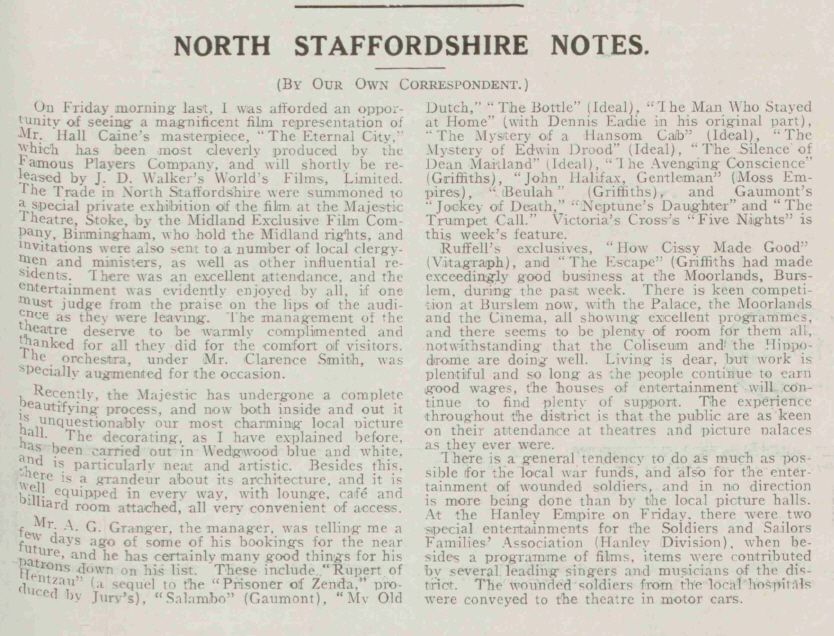 |
|||||||||
|
26 April 2020 Strange times. I have spent the last few months adding some more material to the site, including various items from The Referee. George R. Sims, Buchanan’s friend and collaborator in a series of plays at the Adelphi, wrote a column for the paper under the title ‘Mustard and Cress’, and there’s now a page of extracts from this which mention Buchanan; including a trip to Southend and Sims’ reflections on his friend following his death. This is the final entry, from 31st March, 1912: “I paid a pious pilgrimage to the grave of my ever-regretted companion and collaborator, Robert Buchanan, who lies with those he loved best on earth—his young wife and his gentle, white-haired mother—in the little churchyard by the sea. Ah, me! How long it seems since he and I wandered the bright wonder-way of life together!”
I also came across a letter from Harriett Jay in The Referee of 15th March, 1908, dealing with a perennial problem, which presumably raised its head again following her new-found fame as the author of When Knights Were Bold. I’ve put this in the relevant section, but I thought I’d repeat it here: ‘FROM MISS HARRIETT JAY. SIR,—My attention has just been called to the fact that I am described in several journals as “the widow of the late Robert Buchanan.” Will you allow me to correct this error?
I’ve also added a page on the origins of ‘The Dead Mother’, one of my favourite Buchanan poems (much more unsettling than any poem of Poe’s), and one which I always felt was based on a Scandinavian original. The Origins of ‘The Legend of The Stepmother’ (aka ‘The Dead Mother’)
And finally, I did add this to the site a few weeks ago, but I thought I should give it a mention here. I came across this programme (dated 11th March, 1911) on the Brooklyn Academy of Music site. It’s for a performance of The Strange Adventures of Miss Brown, with an all-male cast, at the Polytechnic Institute of Brooklyn, New York. Here they all are (including one in blackface). |
|||||||||
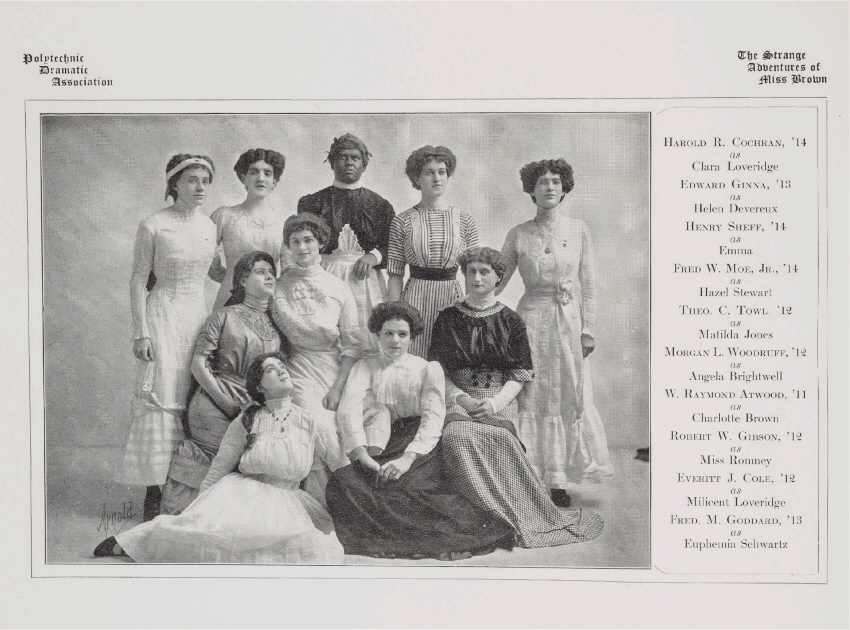 |
|
28 December 2020 Fairies Robert Buchanan is in the news! Not really, and technically I should say ‘was in the news’ since this is a story from January this year. The following is from The (Scottish) Herald: Isle of Skye fish farm blocked after claim of harm to sun-averse fairies. The same story also turns up on The Wild Hunt - Pagan News & Perspectives without all the flashing adverts, so that may be a better bet. ___
Mr. Robert Buchanan as a Diabolist Staying with the Pagans - this is the title of G. K. Chesterton’s review of Archibald Stodart-Walker’s Robert Buchanan, the Poet of Modern Revolt, which is now available on the site. ___
Robert Buchanan and Christ, King of the Wandering Jews This essay by Eric Parisot is now available online through Google Academia. ___
What I Did In The Covid-19 Pandemic Not a lot actually. While others were learning foreign languages or writing novels or walking round their gardens raising money for charity, I was struck by an overall feeling of ennui, which is what I almost said to my barber when the restrictions were first lifted, before realising that I wasn’t living in fin de siècle Paris and Marcel Proust hadn’t just popped in for a short back and sides. I don’t do much of anything anyway, so why the lockdown should have slowed me down even further, I have no idea, except, maybe I was just coming out in sympathy. Anyway, I did manage to add two things to the site. The first was rather inspired by perhaps the most disgusting betrayal of a good man and a noble cause that I’ve ever had the misfortune to witness. You’ll find it in the Miscellanea section under the heading and it concerns Robert Williams Buchanan’s father and grandfather, who were both active supporters of Robert Owen. It concludes with accounts of the attack on Robert Owen on a visit to Burslem on 22nd June, 1840. As Marcel might say, plus ça change, plus c’est la même chose. The other thing I’ve added to the site is another (actually the first) of Buchanan’s books of essays: David Gray and other Essays, chiefly on poetry Back in the early days of the site, when there was nothing online about Buchanan, before Google and the Internet Archive started digitising books, I decided to put all Buchanan’s poems and essays on the site. The Coming Terror I had to do the old way, copying it directly from the book, which I managed to borrow from Hanley Library. So it was a much easier task with David Gray and other Essays, but it’s still taken time. Not least because I’ve added several pages of notes about David Gray. To what end, I don’t know. I did think I would come across startling revelations about the friendship between Gray and Buchanan, but in the end I came to the conclusion that Buchanan made some stuff up. Talk about bangs and whimpers. _____
Diary Archives:
|
|
|
|
|
|
|